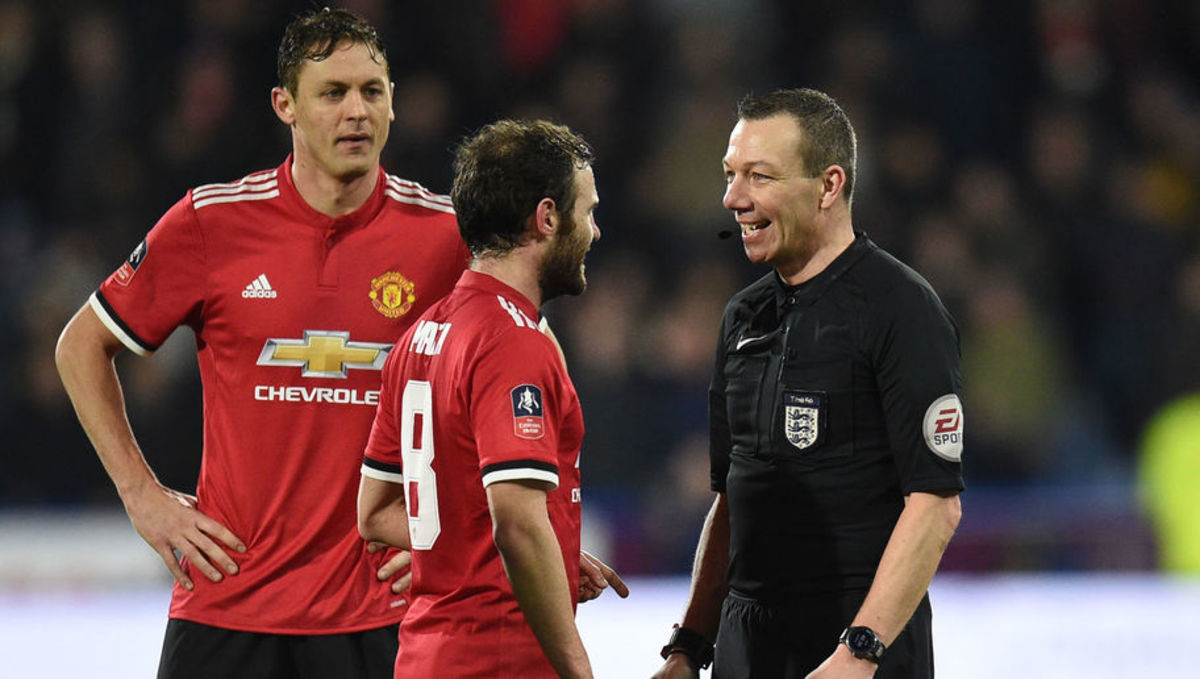FanView: Why VAR Is Essential for the Modern Game Despite Recent Teething Problems

Another week, another VAR controversy.
Since being introduced last year, the Video Assistant Referee (VAR) has come under intense scrutiny. And it now feels like an almost-weekly debate is raised around the benefits and limitations of the system.
The latest scandal came in this weekend’s FA Cup clash between Huddersfield Town and Manchester United when, despite referee Kevin Friend allowing a Juan Mata goal, the decision was eventually made to rule out the goal for offside. This was after a lengthy delay and some less than convincing images (below) being provided to the game’s broadcasters.
The providers of the system Hawkeye have since issued an apology, stating that there was an error in providing the correct image to BT Sport (who showed the game) but that the match officials responsible for using the system to overrule the decision were given the correct image - using straight lines.
The decision ultimately proved to be correct, with Mata’s knee straying offside, yet the issue remains as to when VAR should be used.
The wording used for VAR’s involvement is where a ‘clear and obvious error has occurred. This means, for example, where there is a dubious penalty call and the match official cannot be sure if contact was made with the ball or player, or perhaps if the player has dived to win a penalty.
Saturday’s incident therefore raises the debate of: Should VAR be used on each and every goal?
Take, for example, Christian Eriksen’s goal against Manchester United at the end of January. At first glance the goal appeared to be legal, but following a number of replays and analysis, it was shown that Harry Kane was in fact offside from kick-off. This would have meant that had VAR been in use in Premier League games, that goal would have been ruled out. The end result of that particular game may have been quite different, with Tottenham eventually coming out 2-0 winners.
The result on Saturday ultimately went with United, and despite the decision working in his team's favour, it was Huddersfield manager David Wagner that was most critical of the system - explaining that it had removed ‘the emotion’ from the game.
A lack of communication to those watching both in the stadium and at home is an area that requires significant improvement. Where similar VAR systems have been used successfully in other sports such as tennis and rugby, there seems to be a lack of clarity when the system is used in football.
In rugby, the verbal and visual assistance is available to the fans to understand the rationale behind making a decision - to allow/disallow a try for example. In tennis, a challenge system is used by players should a questionable call go against them.
The way in which each video system is used in these sports has been refined over a number of years and, while it is still not a perfect science, no system that still ultimately involves human decision making and potential error can be. It’s the positive aspects of the use of these systems in other sports that football may benefit from.
Visual prompts that are provided to the referees could be displayed on the big screens at stadiums, as it is in rugby. The option for fans to be able to hear the discussion between the VAR official and referee as they reach their decision can also be made available to those at home.
Teams could be issued with a challenge system similar to that in tennis, where if they feel a call has gone against them they can use their challenge - and should it be successful they retain their right to challenge again. An option of a challenge per half or an additional challenge should a match go to extra time is a discussion that could be had.
Ultimately though, despite the controversy surrounding its use, the decisions made by the VAR system have, thus far, been correct. While it is the significant delay and lack of clarity that frustrates fans, players and coaches – the argument can be made that while a delay is not ideal, reaching the correct decision is a massive benefit to those teams who may have otherwise suffered through human error.
As with goal-line technology, the opposition will always remain. Steering away from a ‘traditional’ game of football is a cause for concern for many, yet if football does not evolve alongside the available technology it risks being left behind as new generations of viewers join.
The VAR system may not be perfect, but it’s implementation is something that is both warranted and, potentially essential, for the long-term sustainability of the beautiful game.







